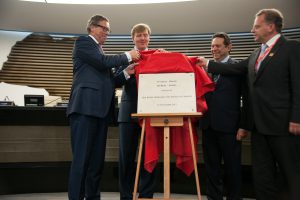Our office in Campinas
Crown Prince Willem-Alexander officially opened the Brazilian office of TU Delft and BE-Basic on the 21st of November 2012, by unveiling a marble wall plaque. This took place during a Biobased Economy Seminar, which was organised by the Ministry of Economic Affairs, Agriculture and Innovation as part of the Royal couple’s State Mission.

‘The transformation towards a bio-based economy is imperative to sustain life and development on this busy planet. But it also offers great opportunities for business and industry. And it opens up new horizons for science and technology worldwide,’ said Willem-Alexander. ‘From Campinas, they [Delft University of Technology and BE-Basic] can start new, productive partnerships extending throughout Brazil.”
‘The development of a sustainable biobased economy is important for everyone. The Netherlands has a strong presence in the chemical and energy industry and wants to move to sustainable production methods. Brazil has a great deal of knowledge and experience in the large-scale production of bioethanol and food. A permanent location will intensify the collaboration for biobased innovation in the area of sustainable energy and chemicals,’ said Luuk van der Wielen, Distinguished Professor of Biobased Economy at TU Delft and Managing Director of BE-Basic.
Brazil leads the way
In a Biobased Economy chemical products, materials and fuels are made from renewable raw materials rather than fossil fuels. The shrinking supply of fossil fuels, increasing oil prices and climate change make the transition to a Biobased Economy an important one. Brazil has made major advances in the creation of such an economy in the past thirty years; at petrol stations, for example, Brazilians can fill their cars with ethanol – and Brazil is the world’s second largest producer of this type of fuel. Brazil also invests a lot of money in research and, for instance, is providing 75,000 international scholarships until 2014.

Strengthening collaboration
‘The opening is a logical subsequent step in the already intensive collaboration and it fits with TU Delft’s strategy,’ according to the President of TU Delft’s Executive Board Dirk Jan van den Berg. ‘Like China, where TU Delft opened three new Research Centres last week, Brazil is also investing in research and education. TU Delft and Brazilian scientists have been working together successfully for many years and the presence of an office will serve to consolidate and further enhance that collaboration.’ BE-Basic and TU Delft have already signed various collaboration agreements, including with Unicamp, the University of Campinas, CTBE, the Federal Institute for Ethanol Research and the industry organisation FIESP. And there are more agreements in the pipeline. In 2010 an eight-million dollar joint Dutch-Brazilian research programme was launched by BE-Basic and the FAPESP (the State of São Paulo’s organisation for scientific research) Bioenergy programme.
Win-win
The TU Delft and BE-Basic office is located in Campinas, where much of the chemical industry and many of the knowledge institutions are concentrated. ‘A sustainable transition to a Biobased Economy is a global challenge that requires new forms of innovation and collaboration,’ said TU Delft Professor of Biotechnology and Society Patricia Osseweijer. ‘Dutch businesses are responding to this by working with Brazilian partners to develop ways of sustainably recycling and reprocessing biomass into chemicals, materials and fuels. This represents a win-win situation for the Netherlands and Brazil.’ It makes more sense to collaborate with bioproducing countries than to just import biofuels and materials. Osseweijer: ‘Joint development means joint security, ownership and responsibility.’ She hopes that the office will grow rapidly in the coming years and become a centre of business, with both Brazilian and Dutch researchers, students and industrial partners.
Sustainability
Sustainability is an important starting point for BE-Basic and TU Delft and therefore also in this Brazilian activity. Together they are focusing on increasing the economic and ecological sustainability of the entire spectrum: food, chemicals, materials, transport fuels and energy. A lot of work is thus also going into developing second-generation biofuels using agricultural waste from sugar plantations, for example. ‘These efforts to make careful use of land and sustainable technology will enable us to improve the sustainability of food production, chemicals and energy,’ said Van der Wielen.


